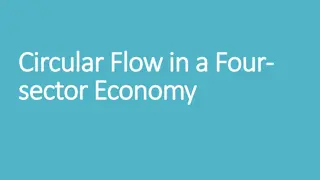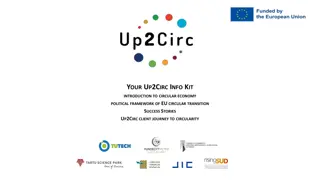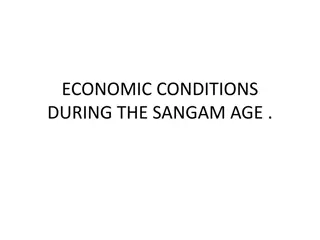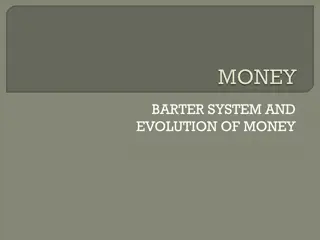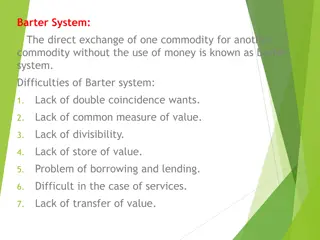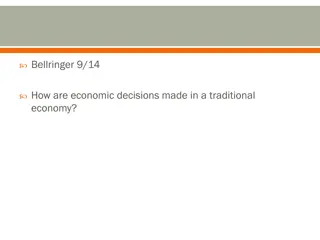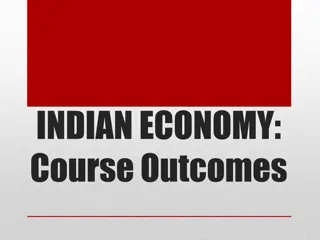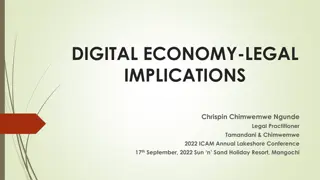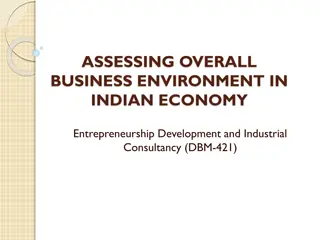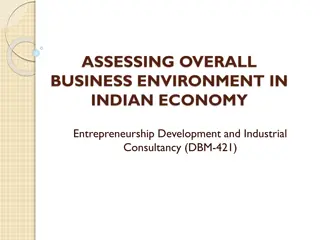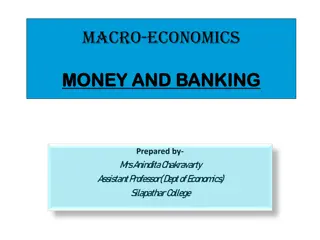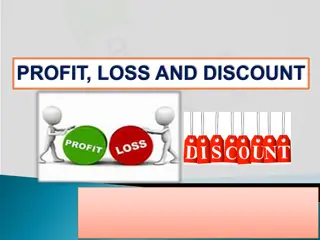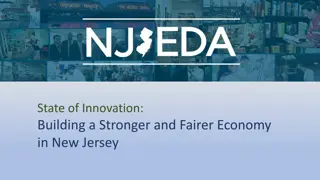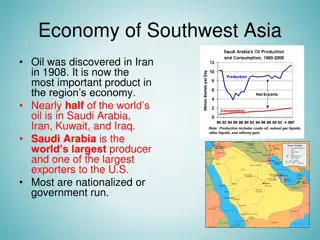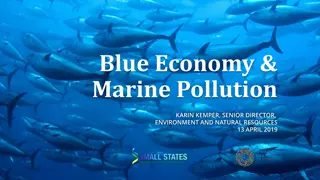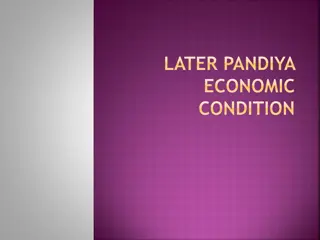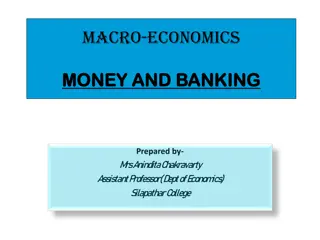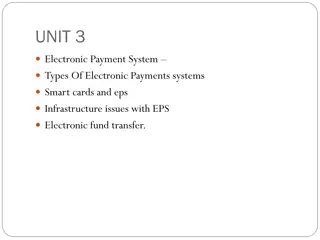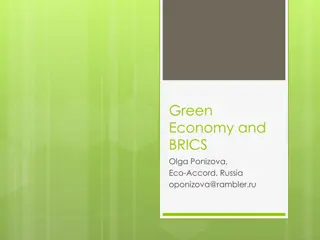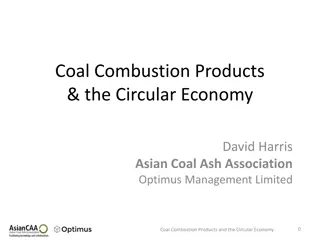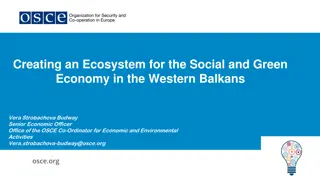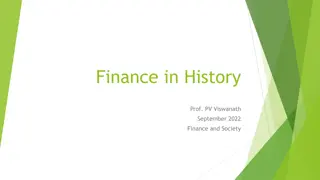Sustainability and the Blue Economy Concepts
The intertwining concepts of sustainability and the blue economy, focusing on historical developments, environmental protection events, and the emergence of sustainability science. Discover the pillars supporting a sustainable blue economy and pathways for inclusive development.
15 views • 40 slides
Circular Flow in a Four-Sector Economy Explained
The circular flow in a four-sector economy involves households, firms, government, and the foreign sector. Each sector plays a crucial role in money flows and payments, contributing to the continuous flow of income. The financial market also has a significant impact on the economy by accumulating sa
3 views • 8 slides
Glossary of Key Terms
Explore essential terms in economics such as command economy, consumer, demand, economic system, free enterprise system, goods, innovation, market economy, marketplace, mixed economy, needs, producer, profit, resources, scarcity, services, supply, technology, trade-off, traditional economy, and want
3 views • 6 slides
Accelerating Towards a Circular Economy Future
The circular economy presents a vital solution to tackle climate change by focusing on regenerative growth, reducing resource consumption footprint, and enhancing material use efficiency. The EU's Circular Economy Action Plan aims to usher in a sustainable future through decoupling economic growth f
2 views • 19 slides
Economic Conditions During the Sangam Age
Agriculture was the primary occupation, with paddy and rice as main crops. Weaving, spinning, fishing, and hunting were vital industries. Trade thrived through barter initially and later coins. Local markets like Angadis and port cities like Puhar facilitated trade. Roman gold coins indicate extensi
3 views • 6 slides
Leveraging Non-Oil Exports for Nigeria's Blue Economy Growth
Nigeria Export Promotion Council (NEPC) focuses on diversifying Nigeria's economy by promoting non-oil exports for sustainable growth. The Blue Economy concept involves sustainable use of ocean resources for economic development. Nigeria's abundant ocean resources such as maritime transportation, fi
0 views • 20 slides
Evolution of Money: From Barter to Electronic Banking
Money has evolved from the barter system to electronic banking through various stages like animal money, metallic money, paper money, and credit money. The invention of money was crucial to overcome the limitations of barter, leading to the ideal utilization of resources and solving issues like the
0 views • 14 slides
Understanding Barter System and Money: Definitions and Functions
Barter system involves direct exchange of commodities without money, facing challenges like lack of common measure of value and divisibility. Money, derived from Latin "Moneta," serves as a medium of exchange, measure of value, and store of wealth, enabling economic transactions and facilitating bor
0 views • 35 slides
Economic Systems in the United Kingdom, Germany, and Russia
Economic decisions in traditional economies are based on customs and beliefs. The United Kingdom has a mixed market economy with a focus on service industries, while Germany's economy is export-based. Russia's economy leans towards a command system. By comparing these economic systems, one can see h
0 views • 11 slides
Understanding Indian Economy: Course Outcomes and Resources
Explore the course outcomes of the Indian Economy, covering economic development, policies, population growth, planning, agriculture, Kerala's economy, and resources for further study. Access government data and publications on the Indian economy for comprehensive learning.
0 views • 9 slides
Economic Conditions During the Sangam Age
Agriculture was the main occupation with paddy as the main crop. Industries like weaving and spinning flourished producing cotton fabrics and fine garments. Fishing and hunting were important occupations, and trade was well-organized internally and externally, transitioning from barter to coin syste
0 views • 6 slides
Advancing Circular Economy Through Flexible Packaging Initiative
Flexible Packaging Initiative is driving a circular economy in Europe by emphasizing the importance of flexible packaging, showcasing key benefits, and outlining steps to ensure circularity in the recycling value chain. The initiative supports harmonized sorting labels, eco-modulated fees, and the p
5 views • 5 slides
Legal Implications of the Digital Economy in Malawi
Explore the legal implications of the digital economy in Malawi as discussed at the ICAM Annual Lakeshore Conference. Topics include the Electronic Transactions and Cyber Security Act, principles of implementation, Malawi CERT, data privacy, and the significance of the digital economy in transformin
0 views • 44 slides
Understanding Circular Flow in a Two-Sector Economy with Financial Market
In a two-sector economy with a financial market, households and firms engage in savings, investments, and borrowing through the financial market, unlike the simple circular flow assumption where no savings are made. This interaction between households, firms, and the financial market plays a crucial
0 views • 4 slides
Overview of Modern Business Environment in Indian Economy
Modern business in the Indian economy is characterized by large size, oligopolistic nature, diversification, global presence, technology orientation, and changing government regulations. The Indian economy features a mixed economy with both private and public enterprises, low per capita income, uneq
0 views • 14 slides
Overview of Business Environment and Economy in India
Business environment in India encompasses a mix of large, oligopolistic, diversified, and technologically oriented enterprises. The Indian economy is characterized by a mixed economy, low per capita income, and limited entrepreneurial potential. External and internal factors influence business opera
0 views • 14 slides
Evolution of Money and Drawbacks of Barter System in Economics
Money's role in facilitating economic exchanges and overcoming the limitations of the barter system are key topics covered in this presentation. Discusses the significance of money, the challenges of barter such as lack of double coincidence of wants, absence of common measure of value, and issues w
0 views • 11 slides
Understanding Profit and Loss in Business Transactions
Learn about cost price, selling price, profit, loss, profit percentage, loss percentage, marked price, discount, successive discount, goods and services tax. Explore the historical context of profit and loss statements from the barter system to modern business transactions. Practice calculating prof
0 views • 31 slides
Insights into India's Thriving Gig Economy and Future Work Trends
India's gig economy, spearheaded by initiatives like IWWAGE, is reshaping the future of work, particularly for women. Key questions revolve around the gig economy's impact, legislative frameworks, and COVID-19 repercussions. Academia investigates the rise of gig work, focusing on platforms like Uber
0 views • 11 slides
Transforming New Jersey's Economy for Growth and Equality
New Jersey aims to revitalize its economy by focusing on key goals for 2025, including driving job growth, increasing wages, fostering diversity in STEM fields, erasing gender and racial wage gaps, and reducing poverty in urban centers. The plan involves investing in people, communities, innovation,
3 views • 5 slides
Strategic Creativity in Tourism Business: Unleashing Innovation and Growth
Explore the dynamic landscape of strategic creativity in tourism business through the lens of the experience and attention economy. Discover how creativity-based approaches can reshape planning and generate novel opportunities in the tourism sector. Delve into the concepts of the experience economy,
5 views • 14 slides
Economy of Southwest Asia: Oil, OPEC, and Cultural Influences
Oil discovery in Southwest Asia transformed the region's economy, with OPEC playing a key role in pricing. Primary products like oil and secondary goods influence the economy. Islam shapes the culture, while debates on Westernization persist.
1 views • 10 slides
The Blue Economy and Marine Pollution: A Comprehensive Overview
The presentation outlines the thriving ocean economy, the concept of the Blue Economy, the World Bank's approach, risks faced by oceans, and the impact of marine pollution on Small Island Developing States and coastal regions. It emphasizes sustainable development of oceanic activities, collaboratio
1 views • 12 slides
Understanding Globalization's Impact on the Economy
Globalization is the increasing unification of the world's economy, leading to greater interconnectedness and interdependence among nations. It has facilitated the exchange of products, services, and ideas globally, impacting economies worldwide. While it offers benefits such as increased productivi
0 views • 10 slides
Economic Development During Pandya Period
Agriculture, industry, trade, and commerce played crucial roles in the economic growth of the Pandya period. The state focused on improving irrigation facilities, leading to flourishing trade and commerce. Agriculture was the primary occupation, with lands divided into different categories. Industri
0 views • 10 slides
Consumer Protection in the Digital Economy: Challenges and Solutions
Exploring the relevance of consumer protection in the digital economy, this content delves into defining the digital economy, top countries in retail internet sales, and initiatives like the CARICOM Model Consumer Protection Bill. It addresses issues of jurisdiction in cross-border transactions and
0 views • 9 slides
Evolution of Money: From Barter System to Currency Exchange
Explore the transition from barter system to the introduction of money in economic exchanges. Learn about the challenges of barter trade such as lack of double coincidence of wants, absence of a common measure of value, and issues with future payments, leading to the development of money as a medium
0 views • 11 slides
Evolution of Electronic Payment Systems: From Barter to Cryptocurrencies
The evolution of payment systems has come a long way, from the barter system in ancient times to the modern era of cryptocurrencies and digital payments. This journey includes the invention of coins, paper money, banknotes, cheques, credit cards, and the latest digital payment methods. The impact of
0 views • 24 slides
Insights into Social Economy and Social Dialogue Research Outcomes
Research outcomes from the Mesmer+ project at HIVA KU Leuven reveal misalignments in social dialogue inclusiveness, challenges faced by social economy entities, and the role of employers in the social economy. Recommendations include enhancing the role of social economy employers and promoting inclu
1 views • 7 slides
Exploring the Green Economy and BRICS Cooperation
The discussion focuses on the importance of the green economy for BRICS nations, suggesting ways for collaboration, especially in addressing climate change and transitioning to a low-carbon economy. The BRICS countries play a crucial role in global stability and sustainable development. Features of
0 views • 22 slides
The Impact of Pandemics on the Shadow Economy Performance
Pandemics have a significant impact on the shadow economy, influencing the legal economy in various ways. The shadow economy serves as a buffer for high unemployment rates and can contribute to budget revenues through legal spending. Studies suggest that a growing shadow economy may reflect dissatis
0 views • 12 slides
Evolution of Services Marketing in the Modern Economy
The shift towards a service economy has transformed marketing practices, leading to the emergence of Services Marketing as a distinct discipline. This evolution highlights the unique characteristics of services, such as intangibility and simultaneous production-consumption. The 1980s mark a pivotal
0 views • 13 slides
Factors Affecting Terms of Trade in International Economics
Terms of Trade (TOT) in international economics represent the ratio between a country's export prices and its import prices, influencing its trade balance. Various types of TOT include Net Barter, Gross Barter, Income, Single Factoral, Double Factoral, Real Costs, and Utility terms. Major factors im
0 views • 4 slides
Spartan Economy and Society: A Closer Look
The Spartan economy was characterized by strict state control, limited property rights, and a focus on meeting basic needs through a barter system. Land ownership reforms aimed to address wealth inequality, providing each citizen with an equal share of land. While the system promoted stability and v
0 views • 9 slides
Understanding the Impact of the Gig Economy on Marginalized Groups in Toronto
This report delves into the effects of the gig economy on racialized and immigrant populations in Toronto. It outlines research findings, stakeholder insights, and strategic recommendations to address the challenges faced by marginalized groups in the gig economy. The study aims to shed light on the
0 views • 25 slides
The Learning Consortium for the Creative Economy Webinar Summary
The webinar on The Learning Consortium for the Creative Economy discussed key topics such as agenda details, presenters' backgrounds, poll results, and insights on the Creative Economy and its importance. Participants engaged in discussions on topics like the Recap on the Creative Economy, Scaling o
0 views • 43 slides
Evolution of Money: From Barter to Fiat Currency
The evolution of money traces back to barter economies where a mutual coincidence of wants was necessary for trade. Settlers in Colonial America used commodity money and fiat money, with specie coins becoming popular due to their mineral content. The term "dollars" originated from the German pronunc
0 views • 60 slides
Coal Combustion Products & the Circular Economy - Addressing Resource Flow Challenges
This discussion delves into the intersection of coal combustion products and the circular economy, emphasizing the need for continuous re-evaluation of resource chains, ecosystem metabolisms, and industrial innovations to ensure sustainable environmental practices and economic growth. Exploring the
0 views • 24 slides
Advancing Social and Green Economy in Western Balkans
Creating an ecosystem for social and green economy in the Western Balkans is crucial for fostering peace, reducing disparities, and promoting sustainable business models. Initiatives like promoting innovation, job creation, and skills development among young entrepreneurs are key to driving growth a
0 views • 7 slides
Evolution of Money: From Barter to Coins in Ancient Civilizations
In ancient Mesopotamia and China, various commodities like barley, metals, and cowries were used as currencies before the emergence of standardized coinage. Control over the money supply became essential for political authority, leading to the minting of coins. The surplus production in societies al
0 views • 10 slides

